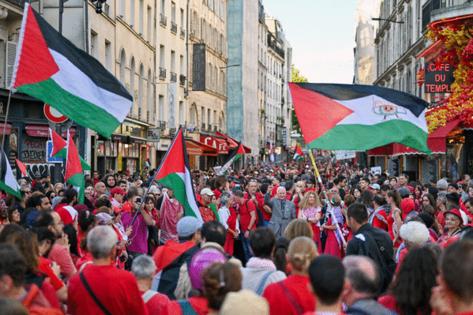Macron move to recognize Palestine adds to outrage over aid to Gaza
Published in News & Features
French President Emmanuel Macron’s decision to recognize a Palestinian state builds on international outrage over Israel’s curbs on humanitarian aid entering Gaza, although it’s unlikely to have an immediate impact on the war against Hamas in the territory.
Macron said in a social-media post late Thursday he will announce the change of status during the next gathering of the United Nations General Assembly in New York in September. He stressed the decision reflects France’s “historic commitment to a just and lasting peace.”
The move was criticized by Israeli Prime Minister Benjamin Netanyahu, who rejects Palestinian statehood, a position that’s hardened since the Hamas attacks of October 2023 that triggered the conflict. Netanyahu said in his own social media post that “such a move rewards terror and risks creating another Iranian proxy, just as Gaza became.”
The U.S. backed its ally Israel, with Secretary of State Marco Rubio describing Macron’s move as “reckless.”
The clash came as Gaza ceasefire talks stalled once again, with the U.S. and Israel withdrawing their negotiating teams from Qatar after the latest round of indirect discussions with Hamas. U.S. President Donald Trump accused the Tehran-backed group, designated a terrorist organization by Washington, of not wanting a deal that would result in the remaining hostages being returned.
“I’ve always said those last 10 or 20 are going to be the toughest, because Hamas knows what happens when they don’t have any bargaining chip,” Trump told journalists Friday before departing for Scotland.
Hamas said it had shown “high flexibility” and is “keen on continuing negotiations.”
But with both U.S. special envoy Steve Witkoff and Netanyahu saying they are considering “alternative options” to release hostages, the future of ceasefire talks is uncertain.
Macron, in common with several other world leaders, is increasingly angered by the Israeli military’s conduct in Gaza and the restrictions on allowing aid to enter the territory. The World Health Organization has warned that Gaza’s 2.1 million people are at risk of starvation, and there have been widespread reports of emaciated babies, children crammed into soup queues and men tussling over bags of flour. Scores of people have been shot dead at food distribution sites.
The Israel Defense Forces said Friday it would allow foreign countries to drop aid into Gaza.
France would be the first country in the Group of Seven to recognize Palestine. While the move would be a symbolic win for the decades-old Palestinian cause, the European nation has no significant political or military leverage in the Middle East.
“Macron never pretended he can end the war and recognizes that only the US can stop the horrors in Gaza,” said Rym Momtaz, editor-in-chief of Carnegie Europe’s Strategic Europe blog. But “as the humanitarian situation in Gaza is rapidly deteriorating, Macron has just put the back of the Europeans and G-7 against the wall in the court of public opinion,” she said.
U.K. Prime Minister Keir Starmer, who is facing a push from senior members of his own government to respond more forcibly to the crisis, said Thursday that “statehood is the inalienable right of the Palestinian people” and a ceasefire would put the U.K. “on a path” to recognition.
He stopped short of committing to a timeframe, though was set to hold talks with Macron and German Chancellor Friedrich Merz about the Gaza situation on Friday.
German government spokesman Stefan Kornelius reiterated the country’s support for a negotiated two-state solution but said the recognition of a Palestinian state would come as a final step. Spain, Ireland and Norway are among Western countries that already recognize Palestine.
French officials have privately claimed that Macron’s push for Palestinian statehood, which started last year, has already had an effect — including by further isolating and weakening Hamas. The head of the Palestinian Authority, Mahmoud Abbas, told Macron he would demand the disarmament of his rival group and the release of all Israeli hostages in Gaza. The PA, which governs parts of the West Bank, has no sway over Hamas or Gaza.
Some European governments are considering trade sanctions and curbs on arms sales to Israel but the decision stalled over lack of consensus. In Ireland, lawmakers are discussing a bill to ban trade with Israeli settlements in the West Bank.
Macron tried to organize a conference with Saudi Arabia in New York in June to push for Palestinian statehood, though it was canceled following the Israeli airstrikes on Iran the same month. French and Saudi officials are now expected to lead a conference to discuss Palestinian statehood next week in New York. The U.S. won’t attend, the State Department said Thursday.
In a bid to mitigate the backlash, French officials have sought to maintain a dialog with their U.S. and Israel counterparts. A senior Macron aide traveled to Washington in recent days to meet advisers of Trump, according to people familiar with the situation.
In comments Friday in Washington, Trump dismissed Macron’s move as inconsequential.
“Look, he’s a different kind of a guy,” Trump said. “He’s a team player, pretty much. But here’s the good news, what he says doesn’t matter.”
_______
(With assistance from Michael Nienaber and Akayla Gardner.)
_______
©2025 Bloomberg L.P. Visit bloomberg.com. Distributed by Tribune Content Agency, LLC.







Comments